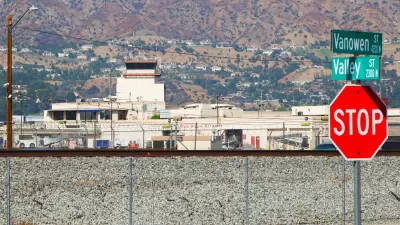Had a deal with Sen. Tom Coburn not been reached on Friday, a shutdown of the Federal Aviation Administration would have begun Saturday morning. Coburn's issue, characterized by NPR as 'flowers vs. bridges', will be dealt with in final bill.
Rather than using the term, 'transportation enhancements' that amount to 1.5 percent of federal transportation funds, NPR reporter Tamara Keith opted to use 'beautification projects' in her description of Sen. Coburn's concern that caused the hold-up:
"Senator Coburn was concerned about part of the bill that directs a small share of highway finding to beautification projects. So, bike paths, museums, beautification on the side of the roads that type of thing. And what he was saying is that states should be able to choose whether they spend money on those things or direct all of their federal funds to bridge repairs and highways."
As the Streetsblog pie-chart shows, landscaping/scenic beautification account for 13%, transportation museums for 1.5%, while bike and pedestrian programs account for 50% of what are generically called 'enhancements'.
Sens. Boxer (D-CA) and Inhoff (R-OK) "spent a lot of time working with Senator Coburn on an agreement that in the longer-term highway bill so not this one, these temporary extensions, but the long-term, more permanent bill that his concerns would be addressed. And so they apparently agreed that in the future, states will be able to decide if they want to pay for flowers or pay for bridges." (sic).
From Streetsblog Capitol Hill: Last-Minute Deal Preserves Bike/Ped Funding. But For How Long?: "In exchange for releasing his stranglehold on the Senate (and the estimated 80,000 workers that could lose their jobs, at least temporarily, if the FAA bill lapsed) Coburn will get to insert his language into the long-term bill, when this latest extension expires."
Thanks to Steve Sondheim
FULL STORY: Coburn Agrees To A Deal On FAA Extension

Alabama: Trump Terminates Settlements for Black Communities Harmed By Raw Sewage
Trump deemed the landmark civil rights agreement “illegal DEI and environmental justice policy.”

Planetizen Federal Action Tracker
A weekly monitor of how Trump’s orders and actions are impacting planners and planning in America.

The 120 Year Old Tiny Home Villages That Sheltered San Francisco’s Earthquake Refugees
More than a century ago, San Francisco mobilized to house thousands of residents displaced by the 1906 earthquake. Could their strategy offer a model for the present?

In Both Crashes and Crime, Public Transportation is Far Safer than Driving
Contrary to popular assumptions, public transportation has far lower crash and crime rates than automobile travel. For safer communities, improve and encourage transit travel.

Report: Zoning Reforms Should Complement Nashville’s Ambitious Transit Plan
Without reform, restrictive zoning codes will limit the impact of the city’s planned transit expansion and could exclude some of the residents who depend on transit the most.

Judge Orders Release of Frozen IRA, IIJA Funding
The decision is a victory for environmental groups who charged that freezing funds for critical infrastructure and disaster response programs caused “real and irreparable harm” to communities.
Urban Design for Planners 1: Software Tools
This six-course series explores essential urban design concepts using open source software and equips planners with the tools they need to participate fully in the urban design process.
Planning for Universal Design
Learn the tools for implementing Universal Design in planning regulations.
Clanton & Associates, Inc.
Jessamine County Fiscal Court
Institute for Housing and Urban Development Studies (IHS)
City of Grandview
Harvard GSD Executive Education
Toledo-Lucas County Plan Commissions
Salt Lake City
NYU Wagner Graduate School of Public Service




























